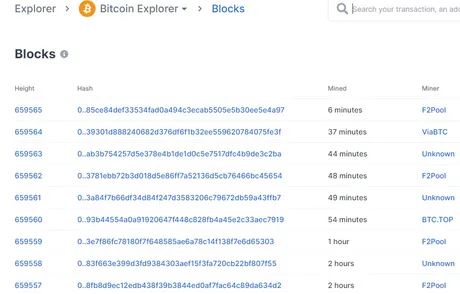Forgot about this game...
Marbles on Stream is a game on https://Twitch.tv that allows streamers to host a Plinko-like Marble simulator for their audience. It was quite the fad a year or two ago and has largely fallen out of favor, but the idea is still ripe for crypto.
Each audience member gets a marble in the simulation and whosever marble finishes the race first often wins some kind of prize (likely a Twitch subscription).
Old post summer 2019
So yeah I already wrote about this but it's definitely worth another look. It's games like this that are going to take crypto to an entirely new level.
Why do I make this claim?
Well, not only are gambling dapps of this nature impossible to regulate, but there is also no legitimate reason to regulate them other than the fact that they threaten the status quo. Gambling regulations are strict because the centralized casinos hosting their services exploit their own userbase for profit. That's their entire business model. With crypto, this centralized entity doesn't exist. We automate out the middleman with a smart-contract enforced by the entire network.

Slot Machine 2.0
So not only would these games be socially hosted on the Internet worldwide and interactive, but they are also exploitation free. Imagine compulsive gamblers having a place to go where they never actually lost any money. They play the games for fun and at the end of the day statistically everyone will break even on average. That's a pretty serious upgrade compared to what we have now.
If we can't exploit gamblers how do we make money?
Simply the fact that users are accessing our network to play the games gives the entire network value. Imagine millions of people coming to Hive to play these games. It doesn't matter that we aren't siphoning off funds from the gambling games because those millions of people are all participating and they all have a tiny bit of stake in the network.
How would it even work?
First we'd need a simulator. There's probably open-source code out there already, but even if their wasn't, corporate espionage is not out of the question.
Corporate Espionage
Honestly this is a topic that deserves its own post. Maybe another time. Seriously though, think about it. Imagine a time when some of these networks are worth trillions of dollars via market cap. Also imagine how hard they would be to control when they were that big and the whole point is borderless censorship resistance.
At a certain point intellectual property will be stolen from big tech, and once that information hits the open market, no amount of legal action from centralized "authorities" is going to stop that property from being used. It's kinda like what China does with American tech already. They take it and make it their own, and there isn't a damn thing we can do about it. What are we gonna do, sue them in their own court? Laughable.
How would it work though.
So the way I imagine this going down is fairly simple. We get the simulator up and running, and you can seed a particular map with a proof-of-work hashing algorithm.
Bitcoin
Because Bitcoin is the most secure network with the highest hashpower, it makes sense to use these hashes for secure random number generation unless the average time of 10 minutes per block is for some reason too long to wait. To be fair, gamblers tend to have a short attention span but let's assume we're using Bitcoin.
https://www.blockchain.com/btc/blocks?page=1

It becomes quite apparent that we could easily be using these numbers (block hash) as the seeds for unhackable random number generation. No one knows what the next Bitcoin hash will be, and no one in the world (literally) would ever throw away a Bitcoin block (currently worth 6.25 BTC) on the off chance that maybe they'll find another one that will get them the win in some Podunk gambling game.
Even if someone wanted to do that they'd have to write special software for that purpose, limiting the number of people even capable of such a thing to a handful of super experienced programmers who simultaneously know how to alter a Bitcoin miner, have the hashpower to mine blocks outside of a pool, and have placed a big enough bet to make it worth throwing away good blocks on the off chance that the next one will be the winner and they'll find it.
AKA 100% impossible. I don't even think that's an exaggeration. It's not 99.99999999% impossible... it's 100%, because these gambling networks can do the math just as well as anyone else, and they wouldn't allow such massive bets as to make undermining the system profitable.
Seriously, how would it work though?
So we have our simulator. Someone boots up a gambling pool on Hive. The simulator will seed itself with a pre-determined Bitcoin block hash. As an example, lets say block 659700.
Because the current height of the Bitcoin blockchain is 659565, this means that 135 blocks need to be mined before we can run the simulation to determine the winner. On average, it would take 22.5 hours to mine that many blocks. This gives everyone about 22 hours to buy in to the pool before players are no longer allowed to participate in this particular event. Not to worry, there theoretically would be many others to choose from.
Using the seed from Bitcoin block hash 659700, anyone would be able to recreate the simulation on their local machine using the open source code that governs the dapp. Every account that bought in would receive a marble, and the marble that crossed the finish line first would be sent the money from the smart-contract. It would also be a trivial process to split up the prize pool for 1st, 2nd, and 3rd place or more.
Trouble in paradise?
The problem with this smart-contract is that it needs to know what the Bitcoin block hashes are. Because this dapp theoretically runs on Hive the witnesses (or other trusted users) would have to provide that information (feed) to the network for everything to run in a decentralized manner. Certainly there are other solutions here but you get the idea.
We could also generate the random numbers using Hive blocks, but that data is less secure than Bitcoin and the chance of cheating is higher.
There's also the issue of the smart-contract holding everyone's money, running the simulation, and knowing who the winner is and transferring the money to them. Seeing as Hive doesn't have smart-contracts yet, this would have to be done on a service like HiveEngine or performed on another centralized node.
As we all know, centralized nodes can be regulated and shut down, so hosting a popular gambling "dapp" on one server is a great way to get it shut down and possibly prosecuted by legal action depending on who's hosting it and who's shutting it down. No one said decentralization was easy.
Conclusion
These kinds of developments are just a drop in the bucket compared to all the crazy stuff that's going to happen over the next decade. The Roaring Twenties are back, and the next ten years may be humanity's more important transition period ever.
Gambling of all kinds has been stifled by government regulation for decades. With the advent of crypto, that regulation is no longer possible when implemented correctly. On another note, proper implementation will crush networks like Tron because all their dapps are designed to exploitatively extract value from their users.
State lotteries and brick & mortar casinos are about to be a thing of the past. Just like an 8th grader can be their own central bank, so to will an eighth grader be able to open up their own casino like it's a lemonade stand. The future is coming, and no one is ready.
Posted Using LeoFinance Beta
Return from Marble Madness to edicted's Web3 Blog
